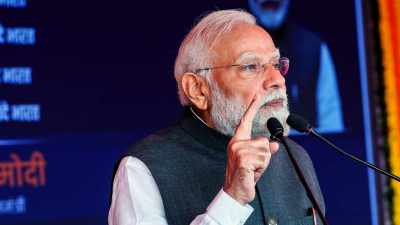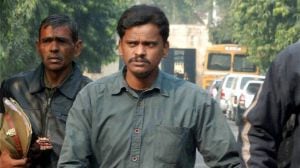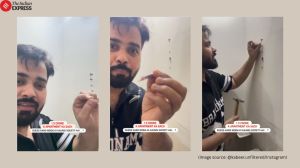NCW spots gender bias in Tamil filmdom
In the Tamil film industry, you can even chance upon a woman cinematographer, but not a woman make-up artist. Even the heroines have to make...

In the Tamil film industry, you can even chance upon a woman cinematographer, but not a woman make-up artist. Even the heroines have to make do with a male beautician on the Kodambakkam sets. The reason? The South India Cine-Television Make Up Artists and Hair Stylists’ Association just would not allow any woman cosmetologist on the sets or on their membership rolls. Women could be hairdressers, not make-up artists in the Tamil film industry.
The ‘‘gender discrimination’’ in the Tamil film industry finally came out in the open yesterday after an enquiry was conducted by a five-member jury appointed by the National Commission for Women (NCW) in Chennai. ‘‘Women in particular crafts are being discriminated against by the Tamil film unions,’’ said NCW member Nirmala Seetharaman.
The NCW has also found how women, and even some men, are denied jobs in the industry by an organised gang of ‘‘film societies’’ that are run like cartels. Thus, a beautician or even a spot-boy can’t aspire to get a job with a film producer unless they pay Rs 40,000-50,000 as membership fee to the ‘‘societies’’. These ‘‘cartels’’ are now facing a public scrutiny after two hair-dressers from Chennai lodged a complaint with the NCW.
The Commission issued a firm directive to the Film Employees Federation of South India to ask all its 23 member-unions to issue advertisements in newspapers saying they won’t discriminate against women. Besides, all the qualified artists who had applied for memberships should be enrolled immediately, it ruled.
Thirty-something Bhanu Bhashyam had trained in New York under well-known cosmetologist Bob Kelly, but Kodambakkam would not let her touch up the faces of heroines. ‘‘I was even barred from doing make-up for advertising films,’’ she says. After Bhanu lodged a complaint with the NCW, the film unions offered her membership as a ‘‘hairdresser’’, but she turned it down. ‘‘Why should I, when I am a qualified make-up artist?’’ she says. In fact, she is the ‘‘unofficial’’ beautician for several lead heroines in the industry, but on the sets, she is not allowed to touch the cosmetic kit.
|
Warangal: NHRC seeks report on boycott of women
|
||
|
• NEW DELHI: Taking suo motu cognisance of a media report, the NHRC has sought a report from the DM and DIG of Warangal, Andhra Pradesh, on the alleged social boycott of two women. The report said in a remote tribal village in the district, Bhanot Samakka, a cook in a school and Bhukia Vimala, health worker at the Angan Bari Centre, have been boycotted by the community after they helped a pregnant woman suffering from AIDS, during delivery. The community panchayat decided that the two be barred from entering the village for four months. — PTI |
||
P. Brinda, 44, was the ‘‘chief make-up artist’’ for Sathyajothi Films, a leading production company, in the 1990s. But the union threatened ‘‘non-cooperation’’ if she was not thrown out of her job. ‘‘What can the producers do if the unions threaten them? So I had to quit the production company,’’ she says. Brinda’s father, a senior make-up artist, could not ‘‘support’’ her for fear of being expelled from the union.
When contacted, a functionary of the South India Make-Up Artists Union said, ‘‘They are not skilled enough to become make-up artists. They are not trained at all. How can we enrol them as members?’’
But the NCW has asked the union to provide membership to the seven complainants immediately. The Commission also directed the Chennai Police Commissioner to protect the women make-up artists. The NCW has also summoned heads of 28 leading ‘‘film societies’’ for a public hearing.





- 01
- 02
- 03
- 04
- 05


























